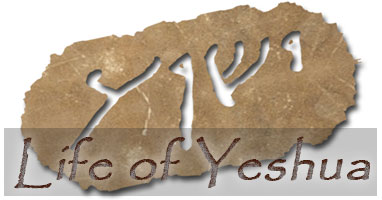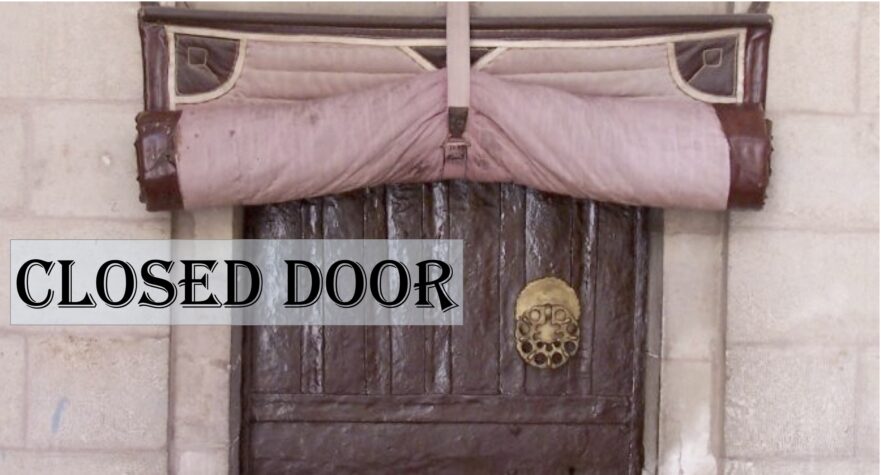How to cite this article:
Joshua N. Tilton and David N. Bivin, “Closed Door,” The Life of Yeshua: A Suggested Reconstruction (Jerusalem Perspective, 2024) [https://www.jerusalemperspective.com/28488/].
(Matt. 7:22-23; Luke 13:25-27)
(Huck 42, 165, 227; Aland 74, 211, 289;
Crook 57, 248, 304)[88]
מִשֶּׁיָּקוּם בַּעַל הַבַּיִת וְיִנְעוֹל אֶת הַדֶּלֶת תַּתְחִילוּ לַעֲמוֹד בַּחוּץ וְלִדְפּוֹק עַל הַדֶּלֶת לוֹמַר אֲדוֹנֵנוּ פְּתַח לָנוּ וְיַעֲנֶה וְיֹאמַר לָכֶם לֹא יָדַעְתִּי אֶתְכֶם מִנַּיִין אַתֶּם וְתַתְחִילוּ לוֹמַר אָכַלְנוּ לְפָנֶיךָ וְשָׁתִינוּ וּבִרְחֹבֹתֵינוּ לִמַּדְתָּנוּ וְיֹאמַר לָכֶם לוֹמַר לֹא יָדַעְתִּי מִנַּיִין אַתֶּם סוּרוּ מִמֶּנִּי כָּל פֹּעֲלֵי אָוֶן
“From the time when the householder rises and locks the door, you will find yourselves standing outside, and you’ll start knocking on the door saying, ‘Our lord! Open up! Let us in!’ But he will answer in reply, ‘I don’t know you. Where are you from?’ And you’ll start explaining, ‘We ate and drank with you! You taught us in our streets!’ But he will say, ‘No. I don’t know where you’re from. Away with all you ne’er-do-wells!’[89]
| Table of Contents |
|
3. Conjectured Stages of Transmission 5. Comment 8. Conclusion |
Reconstruction
To view the reconstructed text of Closed Door click on the link below:
Premium Members and Friends of JP must be signed in to view this content.
If you are not a Premium Member or Friend, please consider registering. Prices start at $5/month if paid annually, with other options for monthly and quarterly and more: Sign Up For Premium
Conclusion
In Closed Door Jesus brought home the message of the Great Banquet parable to his audience by rhetorically bringing them inside the imaginary world of the parable. The invited guests of the Great Banquet parable become the “you” of Closed Door, the people who stand outside knocking and begging for admittance.
As we stated above, this shift from the imaginary world of the parable to the “real” world of Jesus’ audience reminds us of how the prophet Nathan, after telling King David a parable about how a rich man stole a beloved sheep from a poor neighbor, declared to King David, “You are the man!”
The point Jesus made in Closed Door is that Jesus’ audience had been invited to take part in the Kingdom of Heaven by showing radical hospitality to the poor, but through their skeptical attitudes and preoccupation with their own wealth and status they were in danger of turning down that invitation. Unless they changed their ways, they would find themselves shut out of the Kingdom of Heaven.
 Click here to return to The Life of Yeshua: A Suggested Reconstruction main page.
_______________________________________________________
Click here to return to The Life of Yeshua: A Suggested Reconstruction main page.
_______________________________________________________
- [1] Cf. McNeile, 363; Creed, 185; Bundy, 369 §267; Kilpatrick, 23; Beare, Earliest, 174 §165; Fitzmyer, 2:1021; Nolland, Luke, 2:734; Bovon, 2:313; Fleddermann, 680. ↩
- [2] On the author of Matthew’s method of pulling in additional sayings from elsewhere in his sources to build the Sermon on the Mount out of a pre-existing sermon he found in the Anthology (Anth.), see the introduction to the “Torah and the Kingdom of Heaven” complex. ↩
- [3] See Houses on Rock and Sand, under the “Story Placement” subheading. ↩
- [4] Cf. Bundy, 369 §267. ↩
- [5] Pace Bultmann, 116, 130. ↩
- [6] See Narrow Gate, under the “Story Placement” subheading. ↩
- [7] Cf. Fleddermann, 694-695. ↩
- [8] See Houses on Rock and Sand, Comment to L9-20. Cf. Knox, 2:80; Davies-Allison, 1:714; Nolland, Luke, 734; Catchpole, 42. ↩
- [9] Cf. Marshall, 566. ↩
- [10] Cf. Nolland, Luke, 734. ↩
- [11] Cf. Davies-Allison, 3:393; Luz, 2:228; Nolland, Matt., 1009; Llewellyn Howes, “‘I Do Not Know You!’: Reconsidering the Redaction of Q 13:25-27,” Journal of Theological Studies NS 67.2 (2016): 479-506, esp. 484. ↩
- [12] Alternatively, some scholars have argued that Luke 13:25 is a faint reminiscence of the Waiting Maidens parable. See Bultmann, 117, 130; C. H. Dodd, Parables of the Kingdom (rev. ed.; New York: Charles Scribner’s Sons, [1935] 1961), 137-138; Knox, 2:79-80; Jeremias, Parables, 96; David Flusser, “Two Anti-Jewish Montages in Matthew” (JOC, 552-560), esp. 555 n. 2; François Bovon, “Tracing the Trajectory of Luke 13,22-30 Back to Q: A Study in Lukan Redaction,” in From Quest to Q: Festschrift James M. Robinson (ed. Jon Ma. Asgeirsson, Kristin de Troyer, and Marvin W. Meyer; Leuven: Leuven University Press, 2000), 285-294, esp. 288-289. ↩
- [13] Cf. Bundy, 474 §387; Davies-Allison, 3:393. ↩
- [14] See McNeile, 363; Nolland, Matt., 1002, 1009. Cf. Kilpatrick, 76. ↩
- [15] See Luz, 3:228. Cf. Kilpatrick, 32. ↩
- [16] See Peter J. Tomson, “The Song of Songs in the Teachings of Jesus and the Development of the Exposition of the Song,” New Testament Studies 61 (2015): 429-447, esp. 441-443; idem, “Parables, Fiction, and Midrash: The Ten Maidens and the Bridegroom (Matt 25:1-13),” in his Studies on Jews and Christians in the First and Second Centuries (Tübingen: Mohr Siebeck, 2019), 253-260. ↩
- [17] In 2 Clement we read:
εἶπεν ὁ κύριος· Ἐὰν ἦτε μετ’ ἐμοῦ συνηγμένοι ἐν τῷ κόλπῳ μου καὶ μὴ ⸀ποιῆτε τὰς ἐντολάς μου, ἀποβαλῶ ὑμᾶς καὶ ἐρῶ ὑμῖν· Ὑπάγετε ἀπ’ ἐμοῦ, οὐκ οἶδα ὑμᾶς πόθεν ἐστέ, ἐργάται ἀνομίας.
The Lord said, “If you are gathered to me in my bosom but you do not do my commandments, I will throw you away and say to you, ‘Go away from me! I do not know where you are from, workers of lawlessness.’” (2 Clem. 4:5)
Like Matthew’s version of Closed Door, the saying is spoken by Jesus (the Lord), and his recognition of his true followers depends on their obedience. Also, like Matthew, 2 Clem. refers to workers of “lawlessness” rather than “unrighteousness” as in Luke. On the other hand, the Lord’s denial that he knows where these persons come from resembles Luke’s version of Closed Door.
Justin Martyr cited a version of Closed Door in this manner:
Πολλοὶ ἐροῦσί μοι τῇ ἡμέρᾳ ἐκείνῃ, Κύριε, κύριε, οὐ τῷ σῷ ὀνόματι ἐφάγομεν, καὶ ἐπίομεν, καὶ προεφητεύσαμεν, καὶ δαιμόνια ἐξεβάλομεν; Καὶ ἐρῶ αὐτοῖς, Ἀναχωρεῖτε ἀπ᾽ ἐμου.
Many will say to me in that day, “Lord! Lord! Did we not eat and drink in your name and prophesy and cast out demons?” And I will say to them, “Depart from me!” (Dial. §76 [ed. Trollope, 2:7])
While on the whole Justin’s version of Closed Door is closer to Matthew’s, it is interesting to note that he included Luke’s “eating and drinking” (in Justin’s mind a reference to the eucharist?) and dropped Matthew’s anti-climactic “many deeds of power.” In Justin’s First Apology, however, Closed Door is cited as follows:
πολλοὶ δὲ ἐροῦσί μοι Κύριε, κύριε, οὐ τῷ σῷ ὀνόματι ἐφάγομεν καὶ ἐπίομεν καὶ δυνάμεις ἐποιήσαμεν; καὶ τότε ἐρῶ αὐτοῖς, Ἀναχωρεῖτε ἀπ᾽ ἐμου, ἐργάται τῆς ἀνομίας.
But many will say to me, “Lord! Lord! Did we not eat and drink in your name and do deeds of power?” And then I will say to them, “Depart from me, workers of lawlessness!” (1 Apol. 16:11 [ed. Blunt, 27])
In this version the vague reference to “deeds of power” takes the place of prophecy and exorcism. ↩
- [18] Cf. Bultmann, 116 (2 Clement); Bovon, 2:309 n. 7 (Justin). Bellinzoni concluded that Justin relied upon a written source that harmonized the Synoptic Gospels and that 2 Clement drew upon that same source. See A. J. Bellinzoni, The Sayings of Jesus in the Writings of Justin Martyr (Leiden: Brill, 1967), 22-25. ↩
- [19] Lindsey (LHNS, 130 §165) offered מִשֶּׁיָּקוּם as a possible reconstruction of ἀφ’ οὗ ἂν ἐγερθῇ in Luke 13:25. ↩
- [20] See Houses on Rock and Sand, Comment to L9. ↩
- [21] Cf. Kilpatrick, 23; Fleddermann, 683. ↩
- [22] See Houses on Rock and Sand, Comment to L1. ↩
- [23] Cf. Knox, 2:32. ↩
- [24] We also adopted בַּעַל בַּיִת as the reconstruction of οἰκοδεσπότης in Preparations for Eating the Passover Lamb, L34. ↩
- [25] See Houses on Rock and Sand, Comment to L9-20. ↩
- [26] Cf. Fleddermann, 681. ↩
- [27] On the morphology of יִנְעוֹל, see Segal, 78 §170. ↩
- [28] On τότε as a typically Matthean term, see Jesus and a Canaanite Woman, Comment to L22. ↩
- [29] Cf. Plummer, Luke, 347; Marshall, 566. ↩
- [30] See Marshall, 566; Nolland, Luke, 2:734. ↩
- [31] See Randall Buth and Brian Kvasnica, “Critical Notes on the VTS” (JS1, 259-317), Critical Note 4 (261-268). ↩
- [32] On reconstructing κρούειν with הִרְתִּיק, see Friend in Need, Comment to L25. ↩
- [33] See the Conjectured Stages of Transmission discussion above. ↩
- [34] Cf. Fleddermann, 682, 684. ↩
- [35] See Houses on Rock and Sand, Comment to L10. ↩
- [36] Cf. Kloppenborg, 225 n. 219. ↩
- [37] Cf., e.g., Lord’s Prayer, L5; Return of the Twelve, L9; Quieting a Storm, L34. ↩
- [38] Cf., e.g., Not Everyone Can Be Yeshua’s Disciple, L19, L30. ↩
- [39] See Dalman, 24-25. ↩
- [40] See Waiting Maidens, Comment to L38. Cf. LHNS, 179 §227; Fleddermann, 682. ↩
- [41] Pace Gundry, Matt., 501. ↩
- [42] Cf. Fleddermann, 682. ↩
- [43] See Nolland, Luke, 2:734; Fleddermann, 682. ↩
- [44] In Luke’s Gospel πόθεν occurs in Luke 1:43; 13:25, 27; 20:7. See Moulton-Geden, 824. ↩
- [45] In Matthew’s Gospel πόθεν occurs in Matt. 13:27, 54, 56; 15:33; 21:25. ↩
- [46] In Mark’s Gospel πόθεν occurs in Mark 6:2; 8:4; 12:37. ↩
- [47] In LXX πόθεν occurs as the translation of מֵאַיִן in Gen. 29:4; 42:7; Num. 11:13; Josh. 9:8 (2nd instance); Judg. 17:9; 19:17; 4 Kgdms. 6:27; 20:14; Ps. 120[121]:1; Job 1:7; 28:12, 20; Jonah 1:8; Nah. 3:7; Isa. 39:3; Jer. 31[48]:9. In 4 Kgdms. 5:25 we find πόθεν where the qere prefers מֵאַיִן to the written (ketiv) מאן (in MT: 2 Kgs. 5:25). Likewise, in Isa. 41:24 we find πόθεν where MT has מֵאַיִן, which grammarians tell us is to be read as “from nothing” rather than “whence” (cf., e.g., Even-Shoshan, Concordance, 47). ↩
- [48] In MT מֵאַיִן occurs in Gen. 29:4; 42:7; Num. 11:13; Josh. 2:4; 9:8; Judg. 17:9; 19:17; 2 Kgs. 5:25 (qere); 6:27; 20:14; Isa. 39:3; Jonah 1:8; Nah. 3:7; Ps. 121:1; Job 1:7; 28:12, 20. Apart from Josh. 2:4, where the pertinent part of the verse is omitted, all these instances are rendered πόθεν in LXX. ↩
- [49] See Segal, 135 §295. ↩
- [50] Cf. Fleddermann, 683. ↩
- [51] Cf. Marshall, 566. ↩
- [52] Cf. Schweizer, 178; Gundry, Matt., 132; Davies-Allison, 1:693, 715; Luz, 1:375-376. ↩
- [53] See Bovon, “Tracing the Trajectory of Luke 13,22-30 Back to Q,” 289; Bovon, 313. ↩
- [54] See Wolter, 2:197. ↩
- [55] See Gundry, Matt., 132; Davies-Allison, 1:717. ↩
- [56] See LHNS, 131 §165. And cf. Knox, 2:32. Also, compare Delitzsch’s translation of ἐφάγομεν ἐνώπιόν σου καὶ ἐπίομεν in Luke 13:26 as אָכַלְנוּ וְשָׁתִינוּ לְפָנֶיךָ (“we ate and drank before you”). ↩
- [57] Cf. Gundry, Matt., 132; Davies-Allison, 1:714. ↩
- [58] We therefore see no need, as Knox (2:32) suggested, to amend the petitioners’ final proof to “we stood before you when you taught in our streets.” ↩
- [59] See Hatch-Redpath, 2:1140-1141. ↩
- [60] See Dos Santos, 191 (רְחֹב), 192 (רְחוֹב). ↩
- [61] See Shmuel Safrai, “Master and Disciple,” under the subheading “Movable Schools.” ↩
- [62] On this episode, see Daniel R. Schwartz, “Was Yohanan ben Zakkai a Priest?” Sinai 88 (1981): 32-39 (in Hebrew). For an English translation of this article on WholeStones.org, click here. ↩
- [63] Cf., e.g., Nolland, Luke, 2:734; Howes, “‘I Do Not Know You!’: Reconsidering the Redaction of Q 13:25-27,” 491-492; Wolter, 2:197. ↩
- [64] See Gundry, Matt., 132; Nolland, Matt., 341. Cf. Fleddermann, 684. ↩
- [65] See Otto Michel, “ὁμολογέω κτλ.,” TDNT, 5:119-220, esp. 208; Lachs, 150; Nolland, Luke, 2:734. ↩
- [66] The translation of the Aramaic portions of this passage, marked in italics, are adapted from the Soncino edition of the Babylonian Talmud. ↩
- [67] Cf. Luz, 1:380. ↩
- [68] See Moulton-Geden, 725. For a more thorough discussion of οὐδέποτε as a marker of Matthean redaction, see Houses on Rock and Sand, Comment to L18. ↩
- [69] Cf. Wolter, 2:198. ↩
- [70] Pace Nolland, Luke, 2:732. ↩
- [71] See Houses on Rock and Sand, Comment to L19. ↩
- [72] Kilpatrick (24), for example, hypothesized that the pre-synoptic source read, ἀποχωρεῖτε ἀπ’ ἐμοῦ ἐργάται ἀδικίας (“depart from me, workers of unrighteousness”). ↩
- [73] See Catchpole, 231 n. 6; Robinson-Hoffmann-Kloppenborg, 412; Fleddermann, 685; Howes, “‘I Do Not Know You!’: Reconsidering the Redaction of Q 13:25-27,” 497. ↩
- [74] Cf. Knox, 2:32. ↩
- [75] Cf. 1 Macc. 3:6, where the phrase οἱ ἐργάται τῆς ἀνομίας (hoi ergatai tēs anomias, “the workers of lawlessness”) likely occurs as the translation of פֹּעֲלֵי אָוֶן (po‘alē ’āven, “workers of iniquity”). Cf. Daniel R. Schwartz, 1 Maccabees: A New Translation with Introduction and Commentary (AB 41B; New Haven, Conn.: Yale University Press, 2022), 208. ↩
- [76] See Dos Santos, 5. ↩
- [77] Cf. Fleddermann, 685. ↩
- [78] On the author of Matthew’s redactional preference for χωρεῖν and its compounds, see Houses on Rock and Sand, Comment to L19. ↩
- [79] Pace Gundry, Use, 76. ↩
- [80] See Dos Santos, 140. ↩
- [81] See Hatch-Redpath, 1:184-185. ↩
- [82] Cadbury (115) regarded πάντες in Luke 13:27 as an example of redactional Lukan generalizing, but this explanation disregards the agreement with the Hebrew and Greek texts of Ps. 6:9. Gundry (Use, 76) suggested the author of Matthew translated from a text of Ps. 6:9 in which כָּל was lacking, but Gundry’s suggestion lacks manuscript evidence and is, in any case, unnecessary. ↩
- [83] See Hatch-Redpath, 1:25-26. ↩
- [84] See Dos Santos, 5. ↩
- [85]
Closed Door
Luke’s Version
Anthology’s Wording (Reconstructed)
ἀφ’ οὗ ἂν ἐγερθῇ ὁ οἰκοδεσπότης καὶ ἀποκλείσῃ τὴν θύραν καὶ ἄρξησθε ἔξω ἑστάναι καὶ κρούειν τὴν θύραν λέγοντες κύριε ἄνοιξον ἡμῖν καὶ ἀποκριθεὶς ἐρεῖ ὑμῖν οὐκ οἶδα ὑμᾶς πόθεν ἐστέ τότε ἄρξεσθε λέγειν ἐφάγομεν ἐνώπιόν σου καὶ ἐπίομεν καὶ ἐν ταῖς πλατείαις ἡμῶν ἐδίδαξας καὶ ἐρεῖ λέγων ὑμῖν οὐκ οἶδα πόθεν ἐστέ ἀπόστητε ἀπ’ ἐμοῦ πάντες ἐργάται ἀδικίας
ἀφ’ οὗ ἂν ἐγερθῇ ὁ οἰκοδεσπότης καὶ κλείσῃ τὴν θύραν τότε ἄρξησθε ἔξω ἑστάναι καὶ κρούειν τὴν θύραν λέγοντες κύριε ἄνοιξον ἡμῖν καὶ ἀποκριθεὶς ἐρεῖ ὑμῖν οὐκ οἶδα ὑμᾶς πόθεν ἐστέ καὶ ἄρξεσθε λέγειν ἐφάγομεν ἐνώπιόν σου καὶ ἐπίομεν καὶ ἐν ταῖς πλατείαις ἡμῶν ἐδίδαξας καὶ ἐρεῖ ὑμῖν λέγων οὐκ οἶδα πόθεν ἐστέ ἀπόστητε ἀπ’ ἐμοῦ πάντες ἐργάται ἀδικίας
Total Words:
59
Total Words:
59
Total Words Identical to Anth.:
58
Total Words Taken Over in Luke:
58
Percentage Identical to Anth.:
98.31%
Percentage of Anth. Represented in Luke:
98.31%
↩
- [86]
Closed Door
Matthew’s Version
Anthology’s Wording (Reconstructed)
πολλοὶ ἐροῦσίν μοι ἐν ἐκείνῃ τῇ ἡμέρᾳ κύριε κύριε οὐ τῷ σῷ ὀνόματι ἐπροφητεύσαμεν καὶ τῷ σῷ ὀνόματι δαιμόνια ἐξεβάλομεν καὶ τῷ σῷ ὀνόματι δυνάμεις πολλὰς ἐποιήσαμεν καὶ τότε ὁμολογήσω αὐτοῖς ὅτι οὐδέποτε ἔγνων ὑμᾶς ἀποχωρεῖτε ἀπ’ ἐμοῦ οἱ ἐργαζόμενοι τὴν ἀνομίαν
ἀφ’ οὗ ἂν ἐγερθῇ ὁ οἰκοδεσπότης καὶ κλείσῃ τὴν θύραν τότε ἄρξησθε ἔξω ἑστάναι καὶ κρούειν τὴν θύραν λέγοντες κύριε ἄνοιξον ἡμῖν καὶ ἀποκριθεὶς ἐρεῖ ὑμῖν οὐκ οἶδα ὑμᾶς πόθεν ἐστέ καὶ ἄρξεσθε λέγειν ἐφάγομεν ἐνώπιόν σου καὶ ἐπίομεν καὶ ἐν ταῖς πλατείαις ἡμῶν ἐδίδαξας καὶ ἐρεῖ ὑμῖν λέγων οὐκ οἶδα πόθεν ἐστέ ἀπόστητε ἀπ’ ἐμοῦ πάντες ἐργάται ἀδικίας
Total Words:
42
Total Words:
59
Total Words Identical to Anth.:
7
Total Words Taken Over in Matt.:
7
Percentage Identical to Anth.:
16.67%
Percentage of Anth. Represented in Matt.:
11.86%
↩
- [87] Betz (542-544, 549, 551, 554-556) was probably correct that in the apocalyptic judgment scene Jesus does not play the role of judge but of a witness or advocate. Cf. Matt. 10:32, where Jesus promises to acknowledge before his heavenly Father (i.e., the judge) those who have acknowledged him. ↩
- [88] For abbreviations and bibliographical references, see “Introduction to ‘The Life of Yeshua: A Suggested Reconstruction.’” ↩
- [89] This translation is a dynamic rendition of our reconstruction of the conjectured Hebrew source that stands behind the Greek of the Synoptic Gospels. It is not a translation of the Greek text of a canonical source. ↩





